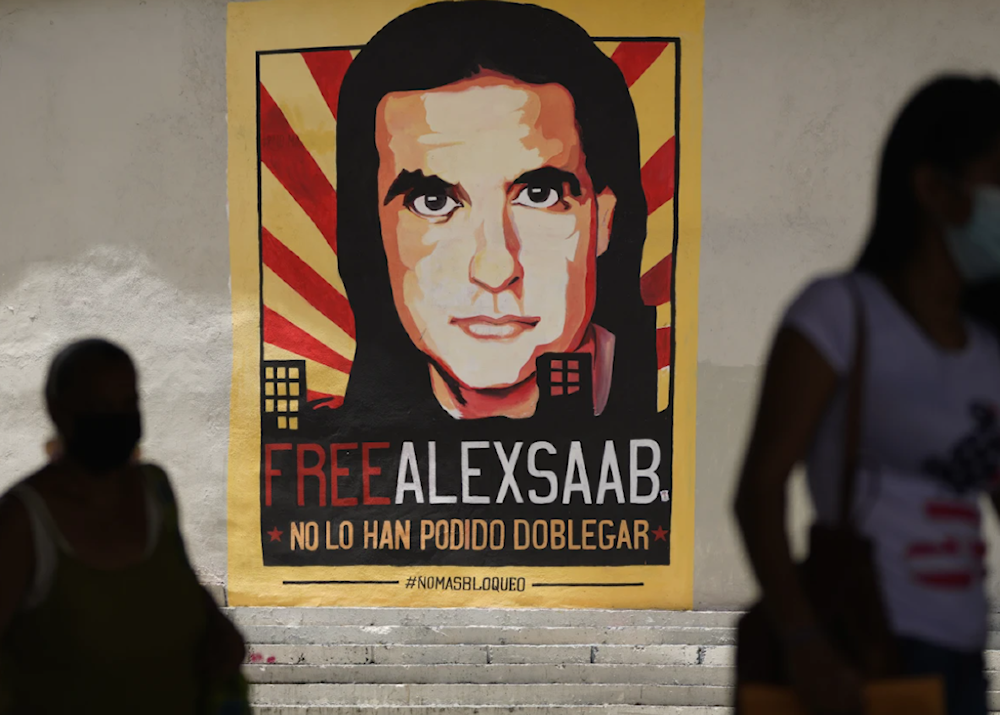US, Venezuela agree on prisoner exchange deal; Alex Saab included
According to the source, those slated to be released by Caracas include 20 opposition-linked Venezuelans who have been imprisoned for some time.
-

A poster calling for the freedom of Alex Saab in Caracas on September 9, 2021 (AP)
A high-level Venezuelan source stated on Wednesday that Venezuelan President Nicolas Maduro's government wants to free some, if not all, of the roughly dozen US citizens who remain imprisoned in Venezuela, according to a person familiar with the situation who was not authorized to discuss the matter publicly and spoke on condition of anonymity, in return for the release of Venezuelan diplomat Alex Saab by the US government.
Caracas considers Saab's arrest illegal, noting that he holds a diplomatic passport.
Cape Verde, which arrested Alex Saab in June 2020 when his plane landed on its territory, had him extradited to the United States in October 2021.
In light of the economic crisis that Venezuela witnessed due to US sanctions, the US Treasury accused Saab of using his accounts in US banks to “launder money and make profits through corruption,” and claimed that he “worked as a front" for President Maduro.
The Venezuelan diplomat was accused by the US of “laundering more than $350 million” through dummy corporations he allegedly founded and that he made profits exceeding $1 billion from operations and deals that they claimed “violated the sanctions regime imposed on Venezuela for selling its oil..." something he has categorically denied.
Early this month, US State Department spokesperson, Matthew Miller, announced that the US was reviewing Venezuela's sanction relief after calling on Maduro and his administration to stick to their agreements with the country's opposition regarding the upcoming elections next year.
The US dared to accuse Caracas of inadequate progress in the release of US detainees and political prisoners after it had organized Operation Gideon to try and remove elected President Nicolas Maduro from power back in 2020.
"We are deeply concerned by the lack of progress on the release of wrongfully detained US nationals and Venezuelan political prisoners" but made no mention of the illegally detained and rather kidnapped Venezuelan diplomat Alex Saab being held in US prisons despite diplomatic immunity.
On October 16, the Venezuelan government and the opposition reached an agreement on new electoral conditions. The deal involves the US providing relief from energy sanctions on President Nicolas Maduro's administration in exchange for implementing measures to open up the electoral process, including permitting European Union observers and establishing a procedure to lift bans on top opponents, allowing for a more equitable political environment.
Maduro is supposed to hold an event later on Wednesday, but no specifics have been released by the administration.
AP reported Wednesday that Alex Saab had been freed by the US.
Who is Alex Saab?
Alex Saab, of Lebanese ancestry, was born in Colombia after his father, Naim, immigrated there. In 2018, Saab was appointed a Special Envoy of Venezuela, based on a certificate signed by then-Foreign Minister Jorge Arreaza.
The UnitedStates has brought #Venezuelan diplomat #AlexSaab to trial in a federal court in Miami, #Florida, where Saab's lawyers submitted official Venezuelan documents to establish his diplomatic immunity. pic.twitter.com/A8DF9B0Wc4
— Al Mayadeen English (@MayadeenEnglish) December 15, 2022
Earlier, in 2022, Camilla Fabri de Saab, president of the Free Alex Saab Movement and wife of the Venezuelan diplomat, and Laila Tajeldine, one of Saab's defense attorneys, attended an event organized by the Simón Bolívar Institute for Peace and Solidarity among Peoples (ISB) and explained that Alex Saab's arrest was illegal and as such, they approached the topic as a kidnapping.
Fabri de Saab reiterated that "what Alex experienced was a real political persecution," which served to intimidate any nation that dared to collaborate with Venezuela amid the unilateral US sanctions against it, which Fabri de Saab refers to as unilateral coercive measures.
"Alex was forcibly taken off the plane, that day there was no order from Interpol; the order arrived the next day and was annulled five days after his kidnapping from the plane," she explained.
She then added that Interpol underwent this process because they knew that a diplomatic status would forbid them from interfering with his course.
Following his kidnapping, and in court, the US prosecutors argued that the documents provided by the Venezuelan defense team barely gave Saab a "special mission" envoy status, which is not covered by the Vienna Diplomatic Agreement as they also denied the legitimacy of the Maduro government, thus consequently, also denying any document that his government legitimizes.
Venezuela's then-Foreign Minister, Carlos Faría, condemned, on September 22, 2022, the "kidnapping of the Venezuelan special envoy," which he described the incident as "a crime that violates international law."
Read more: US tries Venezuelan diplomat Alex Saab, setting dangerous precedent

 4 Min Read
4 Min Read








